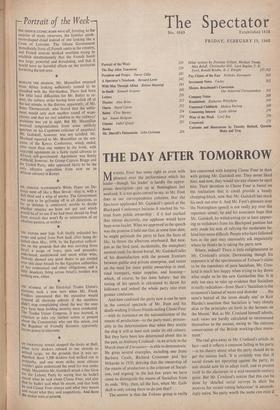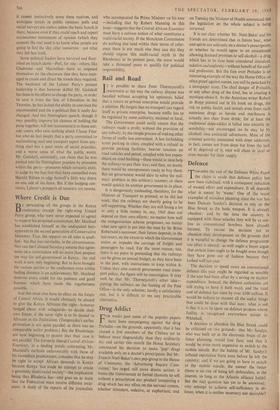THE DAY AFTER TOMORROW
MICHAEL FOOT has some right to crow with pleasure over the performance which his leader—though 'his leader' is hardly the appro- priate description—put up at Nottingham last weekend. It is not quite correct to say, as Mr. Foot does in our correspondence columns, that the Spectator applauded Mr. Gaitskell's speech at the Blackpool Conference because it marked his 're- treat from public ownership' : if it had marked that retreat decisively, our applause would have been even louder. What we approved in the speech was the promise it held out that, at some later date, he might persuade the party to face the facts of life; to throw the albatross overboard. But now, just as the bird (and, incidentally, the metaphor) seemed ready for decent burial, Mr. Gaitskell talks of his dissatisfaction with the present frontiers between public and private enterprise, and insists on the need for more public ownership in steel, road transport, water supplies, and housing— which, of course, he has done before : but the timing of his speech is calculated to throw his followers and indeed the whole party into even greater confusion.
And how confused the party now is can be seen in the comical spectacle of Mr. Foot and his death-wishing Tribune friends nailing Clause Four —with its insistence on the nationalisation of the means of production—to the party mast; presum- ably in the determination that when they scuttle the ship it will at least sink under its old colours. But they have been less determined about this in the past, as Anthony Crosland—in an article in the March issue of Encounter—is able to demonstrate. He gives several examples, including one from Barbara Castle, Richard Crossman and Ian Mikardo in 1950, denying that the ownership of the means of production is the criterion of Social- ism, and arguing 'in the last few years we have come to distinguish the means of Socialism from its ends.' Why, then, all the fuss, when Mr. Gait- skell is only asking them to do just that?
The answer is that the Tribune group is really less concerned with keeping Clause Four in than with getting Mr. Gaitskell out. They never liked him; and now, they would use any chance to eject him. Their devotion to Clause Four is based on the realisation that it could provide a handy chopping-block, now that Mr. Gaitskell has stuck his neck out over it. And Mr. Foot's pleasure over the Nottingham speech is not really joy over the repentant sinner; he and his associates hope that Mr. Gaitskell, by withdrawing (or at least appear- ing to withdraw) from his Blackpool position has only made his task of rallying the moderates be- hind him more difficult. People who have followed him in the past may reasonably ask impatiently where he thinks he is taking the party now.
Where, indeed? There is little enlightenment in Mr. Crosland's article. Devastating though his exposure is of the spuriousness of Tribune's claim to be the repository of pure Socialism, Mr. Cros- land is much less happy when trying to lay down what ought to be the new Gaitskellite line. It it only too easy to rake up evidence that Socialism is really radicalism—from Shaw's 'Socialism is the economist's hatred of waste and disorder . . . the saint's hatred of the seven deadly sins' to Keit. Hardie's assertion that Socialism is 'very closely akin to the principles set forth in the Sermon on the Mount.' But, as Mr. Crosland himself admits, such views are hardly calculated to recommend themselves to the masses, owing to 'the extreme conservatism of the British working-class move- ment.'
The real give-away in Mr. Crosland's article, in fact—and it reflects a common failing in his party —is his theory about what the party should do to get the masses back. It is certainly true that if social trends are operating against the party, its aim should now be to adapt itself, and to present itself to the electorate in a mid-twentieth-century guise. But Mr. Crosland's notion that this can be done by 'detailed social surveys to elicit the motives for recent voting behaviour' is astonish- ingly naïve. No party worth the name can exist if it cannot instinctively sense these motives, and anticipate trends in public opinion; polls and social surveys are useless unless the basic hunch is there, because even if they could reach and report unconscious movements of opinion (which they cannot) the real need is to know what people are going to feel the day after tomorrow : not what they felt last week.
Some political leaders have survived and flour- ished on hunch alone—Peel, for one: others, like Gladstone--and Macmillan—have so imposed themselves on the electorate that they have man- aged to create and direct the trends they required. The weakness of the Labour Party's present leadership is that however skilful Mr. Gaitskell has been in his efforts to change the party, in order to save it from the fate of Liberalism in the Twenties, he has lacked the ability to convince the uncommitted and the a-political that it really has changed. And this Nottingham speech, though it may possibly improve his chances of holding the party together, will not recommend it to those out- side voters who care nothing about Clause Four but who do feel deeply that a party committed to nationalising steel and transport (apart from any- thing else) has a poor sense of social priorities, and a worse sense of what the public wants. Mr. .Gaitskell, admittedly, can claim that he was pushed into his Nottingham position by pressures within the party—pressures which certainly exist, to judge by the fact that they have compelled even Harold Wilson to edge himself a little way down on one side of the fence. But if this hedging con- tinues, Labour's prospects of recovery are remote.







































 Previous page
Previous page